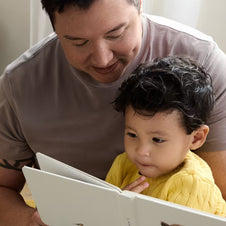Are you wondering why your baby won’t sleep through the night or when your baby will sleep through the night? What does sleeping through the night mean? Let's talk about it.
Taking Cara Babies Classes
What is considered sleeping through the night?
You may have read that a 5-7 hour stretch of sleep is “sleeping through the night.” While that is a developmentally appropriate and even amazing stretch of sleep at some ages, that’s not my definition of a full night of rest! When I refer to “sleeping through the night,” I’m referring to 10-12 hours of sleep with no need for parental intervention. (This may need to include a feeding for some babies until 5-9 months.)
When do babies start sleeping through the night?
Some babies begin to sleep through the night as early as 10-12 weeks, while others don’t sleep through the night until well into the toddler years. This depends on individual development, strategies around sleep, and practice.
I know it would be so nice to hear a specific age for when your baby will naturally start sleeping through the night, but it’s far more complicated than that. Most babies are developmentally capable of sleeping through the night by around 5 months (though some may still need a night feeding until they’re closer to 8 or 9 months).
When can I let my baby sleep through the night without feeding?
As long as your baby is showing stable weight gain and staying on their personal growth curve, most doctors will agree that you can stop intentionally waking your baby for night feedings around 3-4 months. However, some babies will still need to wake for a feeding during the night until closer to 9 months. Please always talk with your pediatrician about any night feeding questions for your specific baby.
If you’re thinking about weaning night feedings (or if you’ve decided it’s best to maintain a feeding in the night) for your baby, I can help. The 5–24 Month Collection will help you create a gentle and gradual approach to weaning night feedings and reaching your sleep goals.
Why won’t my newborn sleep through the night?
Newborns aren’t developmentally ready to sleep through the night because their tiny tummies need more frequent feedings. In the first 4 weeks, newborns need to wake to eat about every 2.5-3 hours, even during the night. Once babies reach about 4 weeks, if they’re staying on their growth curve and eating every 2-3 hours all day long, most doctors will agree that you can typically allow one longer stretch of sleep in the night. That one stretch shouldn’t go longer than their age in weeks plus one. So, if your baby is 4 weeks old, we would wake them up for a feeding no more than 5 hours from the start of their last feeding.
Keep in mind that this doesn't mean that they have to sleep that long stretch, simply that it’s okay if they do. If getting longer stretches feels impossible, know that I can help. My newborn class is full of strategies to help your baby (birth-12 weeks) learn the healthy sleep habits necessary for long stretches of night sleep in the future.
Expert Tip: My no-cry newborn class is full of tips and strategies to help your baby (birth-12 weeks) begin to learn the healthy sleep habits necessary for long, full-night stretches in the future. If your baby is at the later end of that age range (10-12 weeks), it’s not too late! This class is still a great resource for you to start laying a healthy sleep foundation.
Why won’t my 3-5 month old baby sleep through the night?
If your 3-5 month old baby won’t sleep through the night, consider these reasons:
New Skills: During months 3-5, your baby may be learning new skills and starting to roll, babble, or discover their hands and feet. During these times of big developmental growth, we can see sleep regressions.
Changes in Sleep Patterns: Around 4 months, babies move from the newborn phases of sleep into more adult-like sleep stages(1), and many babies experience the 4 month sleep regression.
Nap Transition: Your baby's daytime schedule affects their night sleep. Babies are typically ready to move to three naps around 4-5 months of age. I’ll walk you through the signs to look for and how to drop a nap in the blog: 4 to 3 Nap Transition.
Sleep Strategies: Please know, sleeping through the night is a learned skill that takes time and practice. Not sure where to begin? These strategies can help your baby learn to sleep through the night.
Expert Tip: Having a plan to follow can set your days and nights up for success. My Navigating Months 3 & 4 ebook will give you the tools you need to navigate this tricky stage if your baby is between 13 and 20 weeks. If your baby is 4.5 months or older, The 5–24 Month Collection will be a better option to walk you step-by-step through everything you need for great nights and naps.
Why won’t my 6-12 month old baby sleep through the night?
If your 6-12 month old baby won’t sleep through the night, consider these reasons:
New Skills: Around 6-12 months, your baby may be learning new skills and starting to sit independently, crawl, or even take a few steps. They’re probably making more sounds, like sweet baby giggles or even “mama” or “dada.” These exciting milestones can lead to sleep disruptions.(3)
Changes in Sleep: During these times of big developmental strides, we can see sleep regressions. Your little one will likely experience major physical, mental, and emotional growth around 6 months, 9 months, and 12 months.
Separation Anxiety: Perhaps your baby is clingier than usual or recently started crying every time you leave the room at nap time and bedtime. This could be separation anxiety. Anytime a little one is experiencing separation anxiety, it can impact sleep.
Nap Transition: Your baby's daytime schedule affects their night sleep. Babies are typically ready to move to two naps around 6.5-8 months of age. I’ll walk you through the signs to look for and how to drop a nap in the blog: 3 to 2 Nap Transition.
Sleep Strategies: Please know, sleeping through the night is a learned skill that takes time and practice. Not sure where to begin? These strategies can help your baby learn to sleep through the night.
Expert Tip: Having a plan to follow can set your days and nights up for success. The 5-24 Month Collection is a holistic and fully-customizable plan that will meet your baby where they are developmentally — which means you can start today to begin improving your little one’s nights and naps!
Why won’t my 12-24 month old sleep through the night?
If your 12-24 month old baby won’t sleep through the night, consider these reasons:
New Skills: Around 12-24 months, your little one may be learning new skills and starting to walk, climb, throw, and say more words. These exciting milestones can lead to sleep disruptions.
Changes in Sleep: During these times of big developmental strides, we can see sleep regressions. Your little one will likely experience major physical, mental, and emotional growth around 12 months, 15 months, 18 months, and 24 months.
Separation Anxiety: Perhaps your baby or toddler recently started standing in the crib in protest of you leaving the room, crying when entering their room, or showing a strong preference for one caregiver when it’s time for sleep. This could be separation anxiety. Anytime a little one is experiencing separation anxiety, it can impact sleep.
Nap Transition: Your little one's daytime schedule affects their night sleep.Toddlers are typically ready to move to one nap around 13-18 months of age. I’ll walk you through the signs to look for and how to drop a nap in the blog: 2 to 1 Nap Transition.
Sleep Strategies: Please know, sleeping through the night is a learned skill that takes time and practice. Not sure where to begin? These strategies can help your baby learn to sleep through the night.
Expert Tip: Having a plan to follow can set your days and nights up for success. The 5-24 Month Collection is a holistic and fully-customizable plan that will meet your baby where they are developmentally — which means you can start today to begin improving your little one’s nights and naps!
How can I teach my baby to sleep through the night?
1. Follow age-appropriate wake windows.
The term wake windows refers to the amount of time your little one spends awake between naps. A wake window starts when you pick your baby up out of their crib and ends when you lay them back down in their crib.
Your baby’s awake time during the day can impact the quality and length of their sleep at night. Wake windows that are too short or too long can both cause night wakings. Ensuring your wake window is within the age-appropriate range helps set your nights up for success. Each month, we want to gradually add a bit more awake time to set your baby up for restorative naps and successful nights.
Eventually, there won't be enough time in the day to simply "add a bit more awake time" without dropping a nap. Wondering if it's time? Check out these signs and steps for dropping a nap.
2. Allow for active awake time.
How does your baby spend awake time? Babies are just like us — stimulating our brains and moving our bodies helps us all to sleep better.(4)
Try to fill your baby’s awake time with fun and engaging activities: Play with different toys, get outside, go for a walk, and allow floor time for rolling, sitting, crawling, or pulling up. It doesn’t have to be complicated!
3. Follow a consistent bedtime routine.
A calming bedtime routine will help your baby wind down for the night. When practiced consistently, it will tell your baby’s brain that it’s time for sleep.(5)
Your routine does not have to be complicated! It can be simple and effective. A bedtime routine may include taking a bath, putting on jammies, feeding, and reading stories. Find what works best for your family.
4. Check for comfort.
Being physically comfortable helps us all sleep better. This means we aren't too hot or too cold. Likewise, we need to make sure that your baby is at a comfortable temperature to set them up for the best sleep. Guidelines will tell you that your thermostat should be set at 68-72 degrees, but those are just that — guidelines. We know all homes have varying temperatures, so my real-life mantra when it comes to room temperature is this: Assess, don’t obsess!
Take a look at what you’re wearing to sleep. Are you comfortable? Great! Dress your baby similarly, then assess them! Does their chest and back feel warm, but not hot? Perfect! Too cold or too hot? Add or remove a layer of clothing, and then reassess.
5. Set up a healthy sleep environment.
Environment can play a huge role in baby sleep. Think about it, you probably wouldn’t get a full night of rest if you were in a bright and stimulating environment.
Here are a few tips to create an environment conducive to sleep:
Make it dark: I mean, really dark. Turn off those night lights, and cover the windows (use code Cara for 10% off). Light can actually stimulate a baby’s brain, and tell them that it’s time to be awake!
Make it cool: But not cold! Science shows that as nighttime approaches, our bodies naturally cool down. With a cool environment, you’re reinforcing your baby’s natural instinct to sleep.
Use a sound machine: Silence is actually unusual to your baby. While growing in the womb, your baby was soothed by the constant “WHOOSH” sound of blood rushing through the placenta. A sound machine (use code CARA20 for 20% off) creates that familiar and comforting sound, while also blocking out extraneous noise.
6. Teach your baby to fall asleep independently.
If you’re struggling with night wakings, let me ask you something: is your baby falling asleep independently at bedtime? Falling asleep independently is a huge part of achieving consolidated night sleep.
Here’s why: We all wake up multiple times throughout the night as we transition through sleep cycles. We wake up, check our surroundings, and without even knowing we are awake, we go back to sleep if all seems well. But, imagine this scenario: you fell asleep in your bed and woke up a few hours later in your neighbor’s bed — YIKES! You probably wouldn’t simply roll over and fall back to sleep, because waking in a different place than where you fell asleep is alarming. We expect our surroundings to be unchanged when we awaken in the night. It is the same for your baby.
If your little one was initially rocked to sleep in your arms and then placed into bed, they will likely need you to repeat that pattern multiple times during the night. When babies wake in a different place than where they initially fell asleep, guess what they’ll need to go back to sleep? That same rocking that put them to sleep at bedtime!
If your baby is struggling with falling asleep or night wakings, my classes can help you teach your baby to fall asleep independently using developmentally appropriate strategies.
7. Wean night feedings.
When your little one is waking through the night, you probably want the quickest and easiest way to get back to sleep. For many, the “go-to” solution is night feeding. A quick bottle or breastfeeding seems to do the trick for a while. However, over time more night feedings can lead to a baby that simply isn’t as hungry during the day. This is called “reverse cycling.” Babies learn to snack during the day and rely on their full meals to come through the night. Your baby will continue waking through the night because those caloric needs are not being met during the daytime hours.
The key to ending reverse cycling is to help your baby get most, if not all, of their needed calories during the daytime. In my classes, I’ll teach you how to do just that: be responsive to hunger cues, get needed calories during the daytime, and gently shift feedings from the night in a developmentally appropriate way.
A Note About Newborns: For babies 3 months and under (who are healthy and staying on their growth curve) we can typically allow one longer stretch of sleep in the night. That one stretch shouldn’t go longer than their age in weeks plus one. (ie. If your baby is 4 weeks old, we would allow them to sleep until 5 hours after the start of their last feeding before waking them.)
8. Be consistent.
Consistency is KEY! A consistent approach to your bedtime routine and night wakings will help you build a healthy sleep foundation for your little one. On the flip side, inconsistency can inadvertently reinforce being awake in the night.
If your baby’s sleep is a mess and you aren’t sure where to start, I can help.
For babies 4 months and younger, my Newborn Sleep Bundle will help you with baby sleep strategies that will meet your baby exactly where they are developmentally and help you lay a healthy sleep foundation starting right now.
For babies 5-24 Months, The 5–24 Month Collection will give you a holistic, fully customizable, step-by-step plan to follow that will help you establish consolidated sleep. It will cover bedtime, night wakings, night weaning, early morning wakings, and naps too. Sometimes, just having it all laid out for you by an expert you can trust is exactly what you need.










